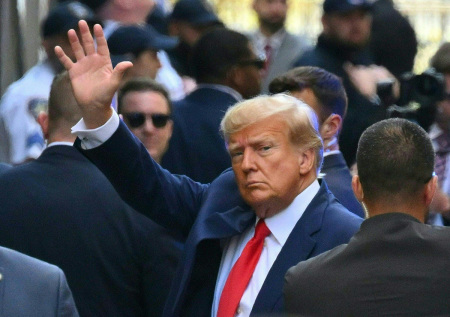Supreme Court to decide if Trump can be kept off Colorado ballot

The United States Supreme Court has agreed to hear oral arguments in a case that will determine if Colorado can remove former President Donald Trump from its 2024 election ballot.
In a miscellaneous order issued Friday, the high court granted the petition for a writ of certiorari in the case of Donald Trump v. Norma Anderson, setting oral arguments for Feb. 8.
Last month, the Colorado Supreme Court released a per curiam opinion in which it ruled that Trump cannot be placed on the ballot for the 2024 election, citing his alleged connection to the Jan. 6 Capitol riot in 2021.
Specifically, the high court cited Section 3 of the 14th Amendment of the U.S. Constitution, which prohibits people from holding public office who “engaged in insurrection or rebellion against the same, or given aid or comfort to the enemies thereof."
"President Trump is disqualified from holding the office of President under Section Three; because he is disqualified, it would be a wrongful act under the Election Code for the Secretary to list him as a candidate on the presidential primary ballot," read the per curiam decision.
"We do not reach these conclusions lightly. We are mindful of the magnitude and weight of the questions now before us. We are likewise mindful of our solemn duty to apply the law, without fear or favor, and without being swayed by public reaction to the decisions that the law mandates we reach."
Colorado Chief Justice Brian Boatwright authored a dissent to the opinion, arguing that the state’s highest court went beyond its scope when it decided Trump had engaged in insurrection.
"Unlike qualifications such as age and place of birth, an application of Section Three requires courts to define complex terms, determine legislative intent from over 150 years ago, and make factual findings foreign to our election code," wrote Boatwright.
"Dismissal is particularly appropriate here because the Electors brought their challenge without a determination from a proceeding (e.g., a prosecution for an insurrection-related offense) with more rigorous procedures to ensure adequate due process."
In response to the decision, Trump filed an appeal with the U.S. Supreme Court on Wednesday, asking the nation’s high court to overturn the state Supreme Court ruling.
“The question of eligibility to serve as President of the United States is properly reserved for Congress, not the state courts, to consider and decide,” argued the appeal.
“By considering the question of President Trump’s eligibility and barring him from the ballot, the Colorado Supreme Court arrogated Congress’ authority.”
The appeal also warned that if the Colorado Supreme Court ruling stands, it “will mark the first time in the history of the United States that the judiciary has prevented voters from casting ballots for the leading major-party presidential candidate.”






















